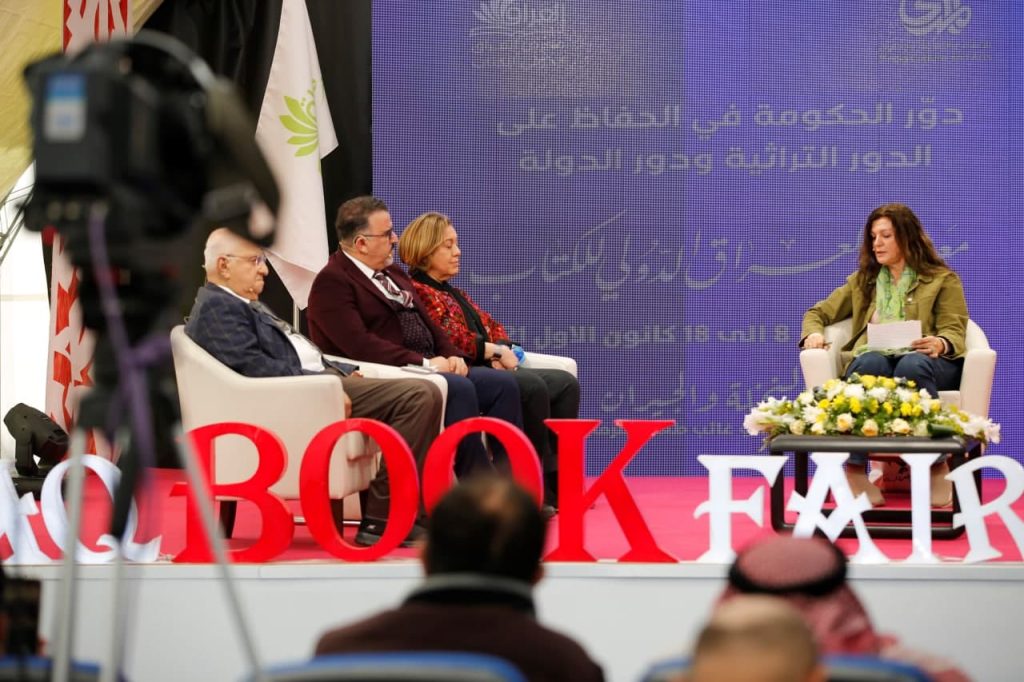
حارث رسمي الهيتي
تصوير: وسام العقيلي
On the ground of the second session of the Iraq International Book Fair, the seminar hall inaugurated its daily curriculum for seminars with a seminar on the role of the government in preserving the heritage role and the role of the state, the plastic artist Zikra Sarsam, who moderated this session, presented her guests (Dr. Muwaffaq Al-Taie, Imad Al-Khafaji, Muhammad Al-Rubaie, Maysoon Al-Damluji, Tariq Harb).
This is how the legal expert Tariq Harb began his speech in advance of his thanks to Al-Mada Foundation, the Iraq International Book Fair and the attendees who decorated the hall, the issue we are talking about today is an old issue that started from the Ottoman era, a law was issued at the time that allowed the transfer of many of our antiquities abroad in the Ottoman era, and then after the national rule (Miss Bell) when it established the Iraqi Museum, I followed all the heritage and antiquities of Iraq as if these antiquities, heritage and antiquities were sons and daughters of it, So it had a big role in being the first to open the Iraqi Museum. Things went on until the issuance of Law No. 55 of 2002, and this law proceeded from the fact that it gave antiquities and heritage an advantage, status, higher position and a higher place so that whoever has a heritage house and reads the law finds that it requires an order from the Minister of Culture announcing that this house is a heritage house, and this means that the house is less than 200 years old, when it exceeds that, we call it monuments, and this is the difference between heritage and antiquities according to the law. The law imposed certain obligations on the owner of the heritage property and the state must take into account this heritage, and the law decided to exclude the house’s imports from the tax, and the owner of the property can rent it in a manner consistent with him, and in the event that the house is damaged or injured by something that has the right to receive a grant from the state, these privileges are provided in accordance with the law to the owner of the property, however, we see many houses and sites have been manipulated in a sad way.
Dr. Muwaffaq Al-Taie, engineer, architect and member of the Fine Arts Association, spoke about the importance of these houses in terms of architecture and planning on the environment and people in their society, and added that there is a problem with regard to laws, as we are talking about something called identity and another we call privacy, stressing that “it is better to isolate heritage from Darbouna or the city.”
He added that in 1920 Miss Bell’s instructions would not have been valuable had it not been for the advent of Wilson, where basic design and basic design is law, Wilson is an apprentice, not even an architect, but he is magnificent, and then Perth came where the actual plan of the city was. We have a starting rule that defines the city wall and what is located inside it is heritage. We later produced the historical center of the city of Baghdad, and a team was formed to study Rusafa and I was one of them, we studied and identified each heritage house, our problem in the law is that it calls all these houses heritage, while the AB designs say the opposite, there are three degrees for each house, the degree of national importance and architectural importance, and the latter requires the heritage house to be part of the heritage area.
Maysoon Al-Damluji, architect and advisor to the President of the Republic, Barham Salih, who contributed to the inclusion of the marshes in the UNESCO list, says, “Since I entered the Faculty of Engineering, this debate about the decline of heritage and archaeological sites continues, and it is like a losing battle, there is a fundamental problem, which is the relationship of society with this heritage, who interacts with this topic is the super-elite, our history is controversial and we must reconcile with our history and heritage, otherwise this talk will remain superior, in Mosul after the destruction that hit the city as a result of the war with ISIS. People were She says this is an opportunity to rebuild the city like Dubai, a minister from the people of Mosul used to say, ‘You will bring us back to the alleys.'”
“Baghdad’s houses were destroyed not because of ISIS, but because of the people of Baghdad themselves, this is the reality, the existing laws are sober and good, and in my work in the House of Representatives, the achievement we made is not only legislating laws, but we prevented many bad bills from passing or legislating them,” al-Damluji added.
Mohammed Al-Rubaie, a member of the Baghdad Provincial Council, spoke about the role of the Council in preserving heritage buildings in Baghdad, the main problem lies in the role of the government in preserving archaeological sites, I lived three sessions of the provincial councils, and this role in the revival and preservation of these sites is very weak and almost shy, we tried as part of interested in heritage and heritage houses with specialists and interested We tried to preserve and give a new image of the region and I mean the area between the “Anal Door to Bab Al-Mu’azzam”, an area estimated at four kilometers Rectangular, where this area constitutes the biggest treasure of the heritage problem in Baghdad, our attempts collided with the private sector, most of this area about 70% of it belongs to real owners who do not know anything about the importance of these sites.
Journalist Imad Al-Khafaji talked about the way out of this crisis, he says, “I sided here to the title the role of the government in preserving the role of heritage and the role of the state, and what was put forward by Mr. Tariq Harb and Mrs. Maysoon Damluji, Law 55 of 2002 defended by Mrs. Damluji in front of bad laws I want her to legislate and pass, where the law presented is a distorted law”
